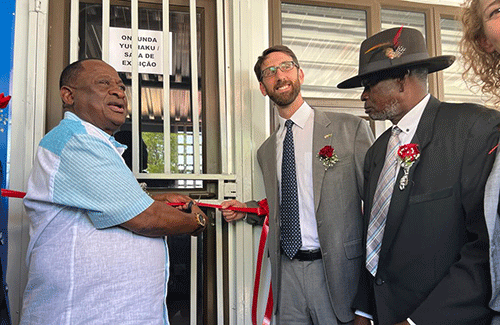Government has said universal health coverage will not be possible without multi-sectoral collaboration.
“This is the cardinal key to improving the well-being of a country’s population. We see universal health coverage (UHC) as a critical element in supporting the attainment of our country’s national development agenda, because a healthy nation, is a prosperous nation. However, progress towards UHC cannot be made without strong multi-sectoral collaboration,” health executive director Ben Nangombe stressed.
Nangombe made the remarks yesterday during the official opening of the high-level stakeholder consultation meeting on UHC.
He indicated the ministry value inclusive collaborative processes involving all sectors, as this will help establish a shared approach and vision to work together to achieve the UHC goals.
While moving a motion on universal healthcare earlier this year, leader of the official opposition McHenry Venaani claimed only 18% of Namibians have regular access to private health services.
The Popular Democratic Movement (PDM) president said it is incumbent upon lawmakers to advocate relentlessly for an equitable provision of quality healthcare for all Namibians.
“It is possible and can be achieved to ensure that all Namibians, irrespective of their income level, lead socially and economically productive lives,” he said.
Health minister Kalumbi Shangula recently assured the process of making UHC a reality in Namibia is well on track.
Nangombe said achieving UHC will represent a seismic shift from where the nation currently is to making Namibia a fairer society.
For this reason, he called on all sectors to be involved in this process to ensure maximum participation.
“Our commitment to UHC is unwavering. I call on the private sector to be part and parcel of this journey. By working together and walking together, we will go far. Let us engender the needed momentum to achieve UHC. Others have done it and we can do it too. If Indonesia did it – if Ghana did it – Namibia can do it too,” he underscored.
The health ministry reiterated the government’s commitment to ensuring that everyone, particularly the most vulnerable people in society, has access to health care services that are integrated, affordable, accessible, equitable, of high quality and responsive to the needs of the population.
This, Nangombe says is done through the government-funded service delivery platform comprising community outreach points, where nurses and support staff at clinics and health centres provide a basic package of services.
Where a particular service may not be readily available in state facilities for one reason or another, the State works with the private sector to secure services as required.
The health status of the population is influenced by many factors outside the health sector.
These are sometimes referred to as the social determinants of health and include aspects such as the level of poverty, food security, unemployment, level of education and working conditions of individuals.
According to Nangombe, while there has been notable progress over the last years in improving health outcomes in this country, more needs to be done.
This includes addressing the disparities across different segments of the population.
“This is where UHC comes in. And this meeting and those planned for the future affords and will afford us opportunities to reflect on the progress Namibia has made, and what could be done to accelerate the realisation of UHC in Namibia,” he said.
– anakale@nepc.com.na



